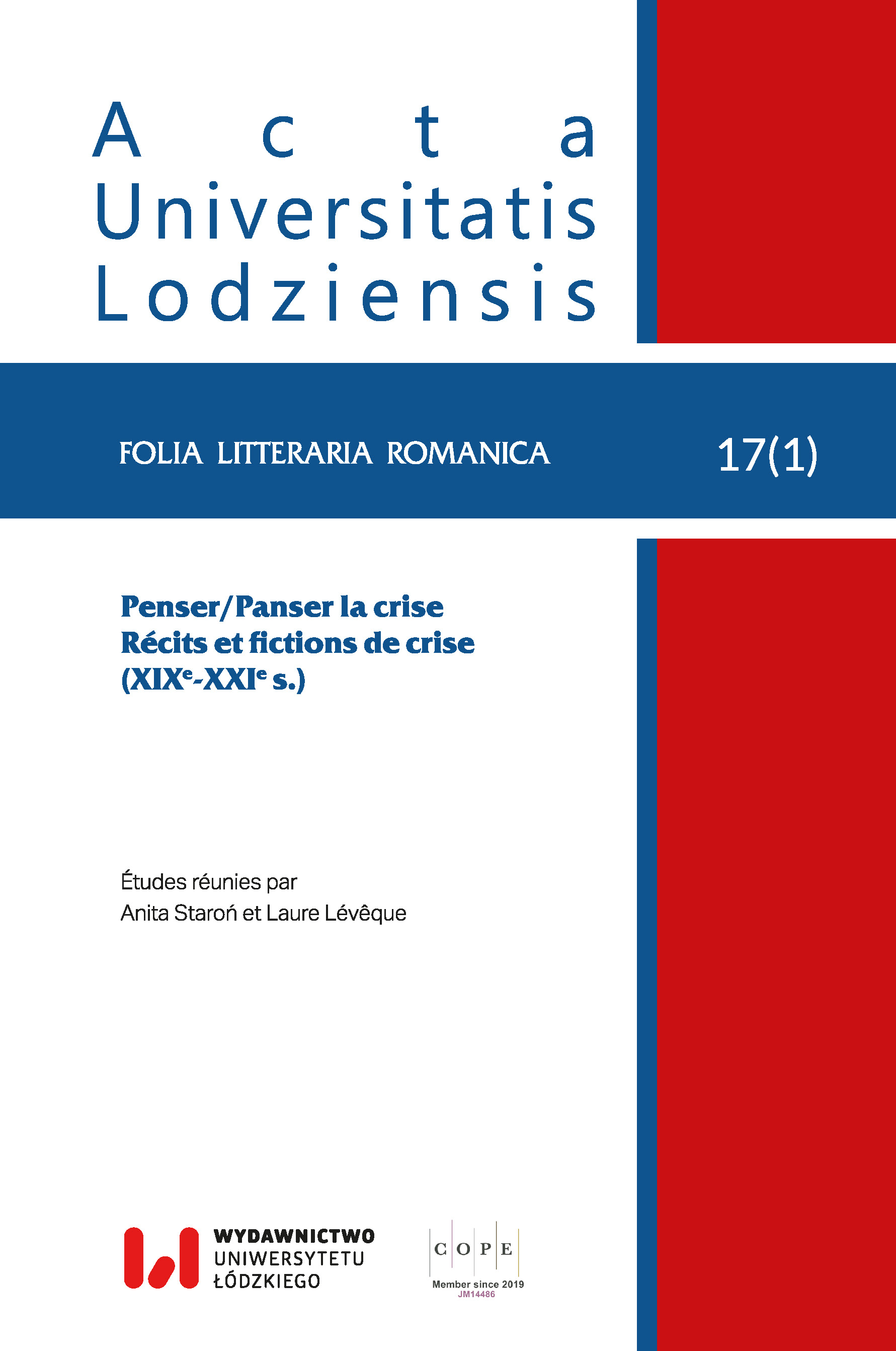Environmental Reflexivity and (Un)awareness of the Ecological Crisis in French Catastrophist Literature of the Nineteenth Century
DOI:
https://doi.org/10.18778/1505-9065.17.1.02Keywords:
ecological crisis, environmental awareness, catastrophist literature, Georges-Louis Leclerc comte de Buffon, Jean-Baptiste Cousin de Grainville, Eugène Huzar, Alfred Bonnardot, Camille FlammarionAbstract
Recent work by science historians has shown that environmental awareness is not unique to our “reflexive modernity”. As early as the 15th century, human agency was envisaged as a factor of change in various climate theories which oscillated between optimism and fear of disaster. This climate awareness informed 19th century catastrophist literature which examined technoculture specific to industrial societies in terms of both its power and negative consequences. The works of Jean-Baptiste Cousin de Grainville, Alfred Bonnardot and Camille Flammarion provide an insight into how literature both appropriates and subverts the knowledge of the economy of nature and of climate, defusing fears and producing a certain kind of the environmental unconscious.
Downloads
References
Bonnardot, Alfred, Fantaisies multicolores, Paris, Chez Castel libraire, 1859
Google Scholar
Bonneuil, Christophe, Fressoz, Jean-Baptiste, L’Événement Anthropocène. La Terre, l’histoire et nous, Paris, Seuil, 2013
Google Scholar
Buffon, Georges-Louis Leclerc, de, « Époques de la nature » in idem, Œuvres complètes de Buffon, Paris, Abel Ledoux, 1844, t. II, p. 71-184
Google Scholar
Chakrabarty, Dipesh, « Le climat de l’histoire : quatre thèses », trad. de Charlotte Nordmann, Revue internationale des livres et des idées, janvier-février 2010, no 15, p. 22-31.
Google Scholar
Crutzen, Paul, « Geology of Mankind », Nature, 3 janvier 2002, vol. 23, no 415, p. 23, https://doi.org/10.1038/415023a
Google Scholar
DOI: https://doi.org/10.1038/415023a
Deneault, Alain, L’Économie de la nature, Montréal, Lux éditeur, 2019
Google Scholar
Engélibert, Jean-Pierre, « La première apocalypse sans royaume : Le Dernier homme de Jean-Baptiste Cousin de Grainville », Licorne, no 129 « L’Apocalypse : une imagination politique », Rennes, Presses Universitaires de Rennes, 2018, p. 33-44
Google Scholar
Flammarion, Camille, Astronomie populaire, Paris, Marpon et Flammarion, 1880
Google Scholar
Flammarion, Camille, La Fin du monde, Ernest Flammarion, Paris 1894
Google Scholar
Fressoz, Jean-Baptiste, « Eugène Huzar et l’invention du catastrophisme technologique », Romantisme, 2010, vol. 4, no 150, p. 97-103
Google Scholar
DOI: https://doi.org/10.3917/rom.150.0097
Fressoz, Jean-Baptiste, Locher, Fabien, « Le climat fragile de la modernité. Petite histoire climatique de la réflexivité environnementale », La Vie des idées, 20 avril 2010, URL : www.laviedesidees.fr/Le-climat-fragile-de-la-modernite.html
Google Scholar
Fressoz, Jean-Baptiste, Locher, Fabien, Les Révoltes du ciel. Une histoire du changement climatique XVe-XXe siècle, Paris, Seuil, 2020
Google Scholar
Fressoz, Jean-Baptiste, Louâpre, Muriel, « L’ère anthropocène : pour en finir avec la fin de l’histoire. Entretien avec Jean-Baptiste Fressoz », Écrire l’histoire, 2015, no 15, URL : http://journals.openedition.org/elh/589 https://doi.org/10.4000/elh.589
Google Scholar
DOI: https://doi.org/10.4000/elh.589
Grainville, Jean-Baptiste Cousin de, Le Dernier homme, Paris, Deterville, 1811
Google Scholar
Huzar, Eugène, La Fin du monde par la science, Paris, Dentu, 1865 (3e éd)
Google Scholar
Huzar, Eugène, La Fin du monde par la science, éd. J.-B. Fressoz et F. Jarrige, Paris, Ère, 2008
Google Scholar
Kupiec, Anne, « L’énigme du Dernier Homme » in Le Dernier Homme, éd. A. Kupiec, Paris, Payot 2010
Google Scholar
Mercier-Faivre, Anne-Marie, Thoma, Chantal (dir.), Invention de la catastrophe au XVIIIe siècle : du châtiment divin au désastre naturel, Droz, Genève, 2008
Google Scholar
Morin, Edgar, « Pour une crisologie », Communications, 2012, vol. 91, no 2, p. 135-152, https://doi.org/10.3917/commu.091.0135
Google Scholar
DOI: https://doi.org/10.3917/commu.091.0135
Shellenberger, Michael, Apocalypse Never: Why Environmental Alarmism Hurts Us All, New York City, Harper Collins, 2020
Google Scholar
Sukiennicka, Marta, « L’apocalypse selon Eugène Huzar : entre les religions et la science » in Foi, croyance et incroyance au XIXe siècle, dir. A. Sadkowska-Fidala, T. Szymański, Wrocław, ATUT, 2019, p. 147-155
Google Scholar
Sukiennicka, Marta, « D’une découverte astronomique du futur : La Fin du monde de Camille Flammarion » in La découverte scientifique dans les arts, dir. A. Fayolle, Y. Ringuedé, Champs-sur-Marne, LISAA éditeur, 2018, p. 189-202
Google Scholar
Published
How to Cite
Issue
Section
License

This work is licensed under a Creative Commons Attribution-NonCommercial-NoDerivatives 4.0 International License.













